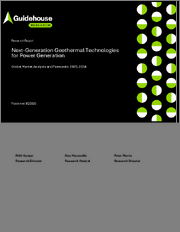
차세대 지열 기술(NGGT)은 기존의 수열 기술을 넘어 기존에 없던 석유 및 가스(O&G) 부문의 기술을 활용하여 지하의 고온에 도달하기 위한 일련의 옵션으로 향후 10년 이내에 상용화될 수 있는 산업이 될 수 있습니다. NGGT는 기존 기술, 정책, 인허가 제도, 노동자의 기술을 기반으로 하고 있으며, 처음부터 시작하지 않고도 기술 혁신을 가능하게 합니다. NGGT는 깨끗하고 안정적인 열을 추출하여 전력으로 변환하는 효율적인 방법을 제공합니다. 이 전력은 AI의 발전과 그동안 연료에 의존하던 부문의 전기화로 인해 수요가 가속화됨에 따라 필수 불가결한 요소로 떠오르고 있습니다. 일부 NGGT는 유연성이 높아 에너지 저장 장치처럼 늘리거나 줄일 수 있습니다. 이는 변동하는 재생에너지 발전의 균형을 맞추고 송전망의 신뢰성을 유지하는 데 도움이 될 수 있습니다.
NGGT 상용화 경쟁은 이제 막 시작됐습니다. 상업적 시장이 형성되기 위해서는 재정적 지원이 획기적으로 확대되어야 하고, 사회와 정책 입안자들의 인식을 제고하기 위해서는 혁신적인 커뮤니케이션 전략이 필요합니다. 깨끗하고 안정적인 전력에 대한 수요가 가속화되고 NGGT를 데이터센터와 같은 대규모 에너지 소비자와 결합할 수 있는 새로운 기회가 등장함에 따라, 전략적 투자와 협력은 필수적입니다.
본 보고서는 세계 발전용 차세대 지열 기술 시장을 조사 분석하여 각 지역의 2025-2034년 발전 용량 추가 및 수익 예측을 제공합니다. 석유 및 가스와의 기술 시너지, 노동력 기회, 광물 회수 가능성 등 시장 성장의 주요 촉진요인을 검토하는 한편, 자금 조달 제약, 엔지니어링 과제, 정책 불확실성 등의 장벽도 언급하고 있습니다. 특히 NGGT의 전개와 상업화에 영향을 미치는 요인에 초점을 맞추고, 진화하는 정책 상황에 주목하고 있습니다.
Next-generation geothermal technology (NGGT)-a suite of options that goes beyond conventional hydrothermal technologies and leverages practices from the unconventional oil and gas (O&G) sector to reach hotter temperatures under the ground-is primed to become a commercialized industry within the next 10 years. NGGT builds on existing technologies, policies, permitting regimes, and workforce skills, enabling innovation without starting from scratch. It offers an efficient way to extract clean firm heat and convert it into power, which will be essential as demand accelerates due to advances in AI and the electrification of sectors historically reliant on fuels. Some NGGTs are highly flexible, ramping up and down like an energy storage unit-a capability that could help balance variable renewable generation and maintain grid reliability.
This report analyzes the global market outlook for NGGT, providing forecasts for capacity additions and revenue from 2025 to 2034, segmented by major regions. It examines the primary drivers of market development, including technical synergies with O&G, workforce opportunities, and mineral recovery potential, while also addressing barriers such as financing constraints, engineering challenges, and policy uncertainty. Special attention is given to the evolving policy landscape, highlighting factors that will influence NGGT deployment and commercialization.
The race to commercialize NGGT is just beginning. Financial support must grow exponentially for a commercial market to form, and a transformative communications strategy will be needed to build public and policymaker awareness. As demand for clean firm power accelerates and new opportunities emerge for pairing NGGT with data centers and other large energy consumers, strategic investment and collaboration will be essential. This report offers actionable insights for stakeholders seeking to understand the opportunities and risks in this rapidly evolving sector.